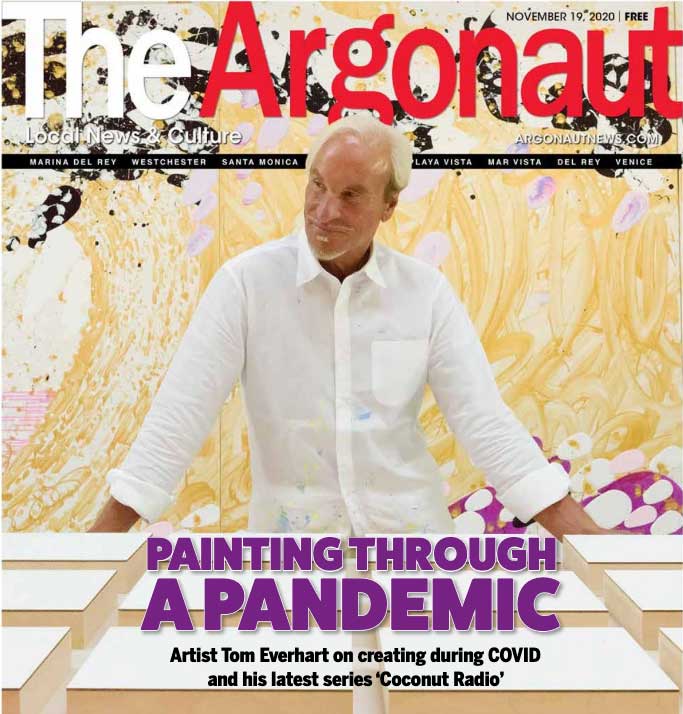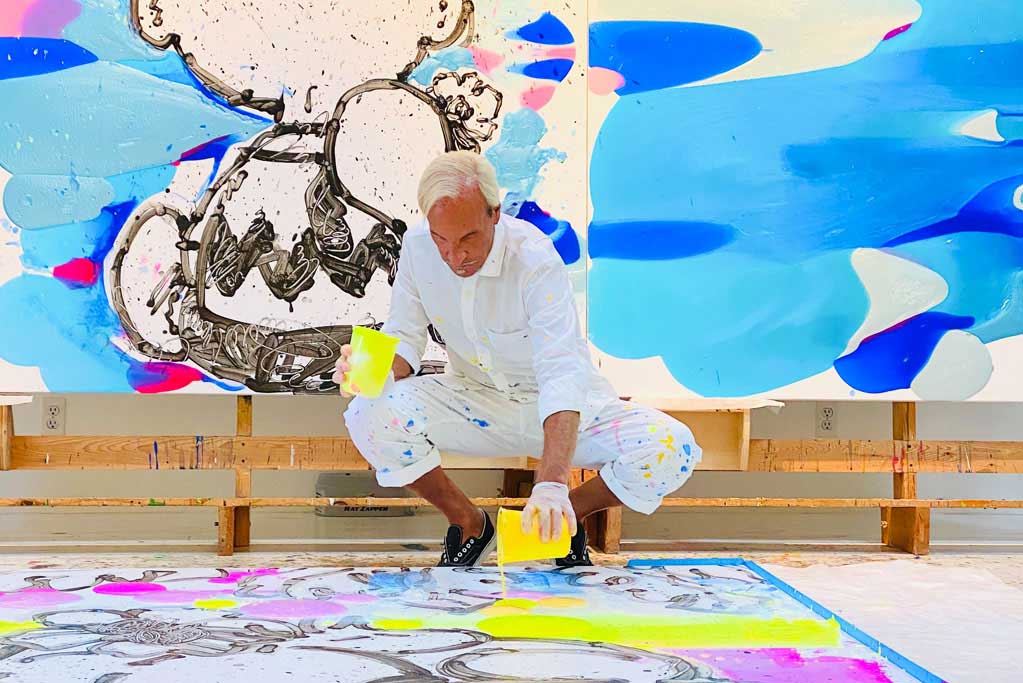
ARTIST TOM EVERHART ON CREATING DURING COVID AND HIS LATEST SERIES ‘COCONUT RADIO’
By Kamala Kirk
When COVID-19 occurred back in early March, Tom Everhart saw the silver lining in the situation, taking the opportunity to focus on creating new art without any distractions. Prior to the pandemic, his schedule was filled with frequent travel, art shows and gallery openings, and various media events. But these days, he spends most of his waking hours in his Venice Beach studio doing what he loves most: painting.
“I’ve probably completed about two to three years’ worth of work since the beginning of the year,” Everhart says. “I’ve never had so much uninterrupted time. I lie in bed at night having conversations with myself trying to decide which concept I want to create next. I have so many images in my head right now. If I were to get hit by a truck tomorrow, I would be really upset because I still have so much left to create.”

With close to 100 pieces already under his belt for his current series, “Coconut Radio-The Sha La La Paintings,” Everhart shows no signs of slowing down. He started the paintings in January, unaware that his new project would end up becoming a reflection of the soon-to-be global crisis.
“I had been doing political themes for a long time, but it had started to get to me and I was becoming depressed by the subject matter,” Everhart shares. “What really got me the most was this last election we had, which was very important. We were very concerned about it, and for the people that live here in Venice, the upcoming election of the local officials was just as important, if not more so. Because of that personal connection to those politics, I decided to do something that would address how to make it better instead of just talking about it.”
Everhart, who also has a studio in French Polynesia where he and his wife Jennifer typically go every three months, named his latest body of work “Coconut Radio,” which is a term used in French Polynesia that refers to the way the locals receive and share information around the islands.
“You might ask where I heard a bit of news from, then I’ll say, ‘Oh, I heard it from so-and-so through the coconut radio,” Everhart explains. “That’s why I named the series that, not knowing that in a few months we would all be communicating like coconut radio. One of the big issues we’re dealing with is education. The only way to educate is through communication, which brings us together. I decided that I was going to protest the virus with color and imagery, and deal with the anxiety and isolation it has caused.”
A recurring theme that can be seen in Everhart’s art over the years, including his “Coconut Radio” series, are his depictions of the late cartoonist Charles M. “Sparky” Schulz’s comic strip ‘Peanuts.’ The two met back in 1980 when Everhart was a young artist fresh out of graduate school, who drew and presented renderings to Schulz’s studios for a freelance project. Everhart impressed Schulz with his ability to reproduce the cartoonist’s line art almost exactly, and over the years they became close friends and collaborators. Prior to Schulz’s passing, he drafted a legal agreement that gave Everhart exclusive permission to use the visual object matter from Schulz’s imagery in his art for the “term of his life.”
The first painting Everhart created for the “Coconut Radio” series was “Sha La La,” a 16-foot work that depicts ‘Peanuts’ characters Snoopy and Woodstock. Snoopy is wearing a Polynesian headdress and holding Woodstock in his arms like a hero, while Bora Bora can be seen on the horizon line.
“Cartoon imagery is somewhat humorous and Polynesian imagery is paradise,” Everhart says. “Every single piece has some reference to that Polynesian ecstasy, whether it’s a flower behind the ear, a palm tree or a flower wreath. And sometimes the paint itself is the reference.”

Another work, “Blue Lagoon,” features Snoopy leaning against Charlie Brown, who is wearing a headdress, and the two of them are gazing out over the lagoon together.
“If you look straight ahead at the painting and take those two characters out, you’ll feel like you’re in a lagoon,” Everhart says. “You can feel the fluidity, you can feel the water, and you can feel those things that make all of us the same. Water is important to all living things and a large percentage of our bodies are made of water. No matter what color our skin is or what our beliefs are, we are all made out of the same things.”
“Bon Appétit” depicts Snoopy going into the water. While it looks like he’s going for a swim, Everhart points out that the piece is simply about life in that moment and environment.
“I paint right outside of our overwater bungalow in French Polynesia and at sunset the birds dive straight down into the water,” he shares. “My work is never about the way things look. It’s the way things feel, like the hot air and the coolness that comes at night or after the rain. A lot of the times the work I create gets nicknamed pop art, which is completely wrong because pop art is about exactly what you see. My work isn’t supposed to look like what I’m seeing, I’m camouflaging it. And I’m not painting about characters in popular culture. I’m using characters that I have borrowed and learned from Sparky to create a feeling and an experience.”
For this particular body of paintings, Everhart laid each canvas flat on the ground, then poured the paint on the surface of the canvas. He has to determine right away how the entire painting is going to come together, because he only has about 30 minutes before the paint starts to dry. Once the paint has been poured, he lifts the canvas up in the air, creating the illusion of water when one color of paint goes over another. He also mixes in white archival glue with his paints and acrylic varnish, which helps him with the pouring, and results in the colors changing tones by the time the paint dries.
“When I pour the paint, it’s almost like that of a musician having to understand notes—you have to be able to look at them and hear the music,” Everhart says. “As for the term ‘watching paint dry,’ we do that all the time because many of the paintings take at least a month until that white glue turns into a clear color.”
Everhart works on multiple pieces at once, sometimes as many as 50 or 60. His studio in Venice, which he lives and works out of, has two large floor spaces akin to basketball courts. The bottom floor is exclusively a work space while the top floor is reserved for larger canvases due to the height of the ceiling, which can accommodate his bigger pieces. Some works Everhart can complete in a couple of days, while others can take as a long as year.
Currently, Everhart continues to work on the “Coconut Radio” series and plans to have a show when the pandemic situation improves. When asked what inspires his work the most, Everhart says it’s the feeling of being alive.
|

